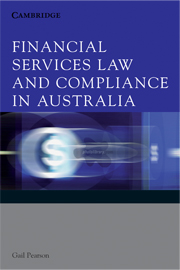Book contents
- Frontmatter
- Contents
- Preface
- List of Abbreviations
- Table of Statutes
- Table of Cases
- 1 The financial citizen and the market
- 2 The regulatory structure
- 3 An overview of financial services reform
- 4 Licensing financial services providers
- 5 The role of disclosure in the distribution of financial products
- 6 Selling financial products and other conduct
- 7 Deposit-taking and payments
- 8 Investment
- 9 Insurance
- 10 Consumer credit
- 11 Superannuation
- 12 Compliance, enforcement and remedies
- Index
- References
5 - The role of disclosure in the distribution of financial products
Published online by Cambridge University Press: 05 June 2012
- Frontmatter
- Contents
- Preface
- List of Abbreviations
- Table of Statutes
- Table of Cases
- 1 The financial citizen and the market
- 2 The regulatory structure
- 3 An overview of financial services reform
- 4 Licensing financial services providers
- 5 The role of disclosure in the distribution of financial products
- 6 Selling financial products and other conduct
- 7 Deposit-taking and payments
- 8 Investment
- 9 Insurance
- 10 Consumer credit
- 11 Superannuation
- 12 Compliance, enforcement and remedies
- Index
- References
Summary
[D]isclosure is an important aspect of corporate governance, and very often a reflection of the culture of compliance of the corporation.
It has long been assumed that consumers make poor decisions because of information deficiencies resulting from an uneven distribution of market information. Uninformed or poorly informed consumers have a tendency to either shun the market altogether or buy inappropriate products – situations that lead to consumer detriment and market inefficiency. Armed with the correct information, however, consumers can make comparisons between providers, advisers and products and thus arrive at better decisions. Of course access to information results not only in better consumer decision-making, but also in better pricing, a level of protection against fraud and misrepresentation, and a fairer, more efficient market overall. Schwarz and Wilde have shown that only about one-third of [marginal] consumers need to engage in comparison shopping in order to affect supplier behaviour.
The concept of the ‘informed consumer’ has been central to policy making since the mid 1970s. At that time, disclosure regimes, which function by imposing disclosure obligations on those market participants in possession of certain information, were adopted as a generally accepted, non-interventionist means of and enhancing consumer sovereignty and promoting competitiveness and market efficiency. Information obligations can promote party autonomy. These can be viewed in terms of both parties being able to make free and informed decisions by enabling the recipient of the information to act in an informed manner to further his or her own interests.
- Type
- Chapter
- Information
- Financial Services Law and Compliance in Australia , pp. 148 - 198Publisher: Cambridge University PressPrint publication year: 2009



